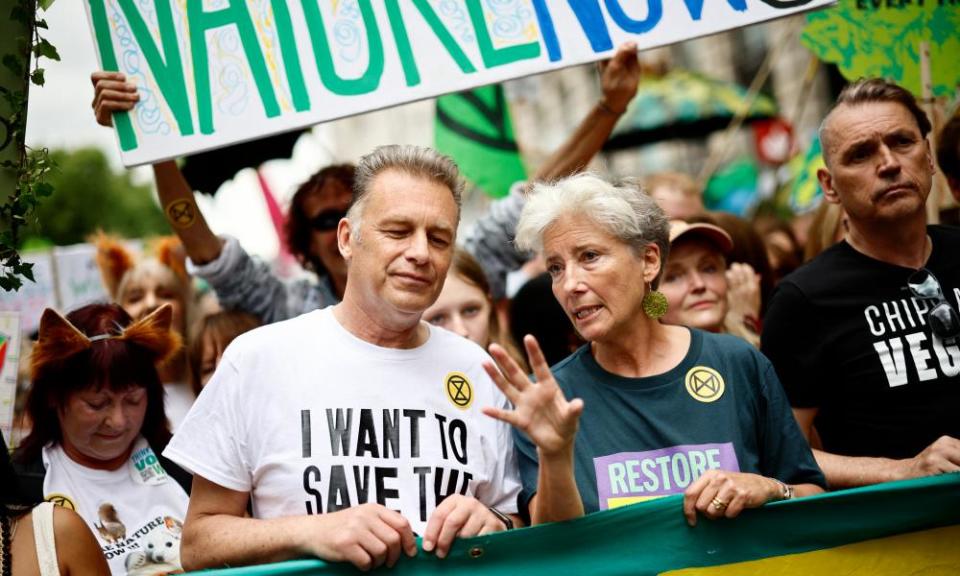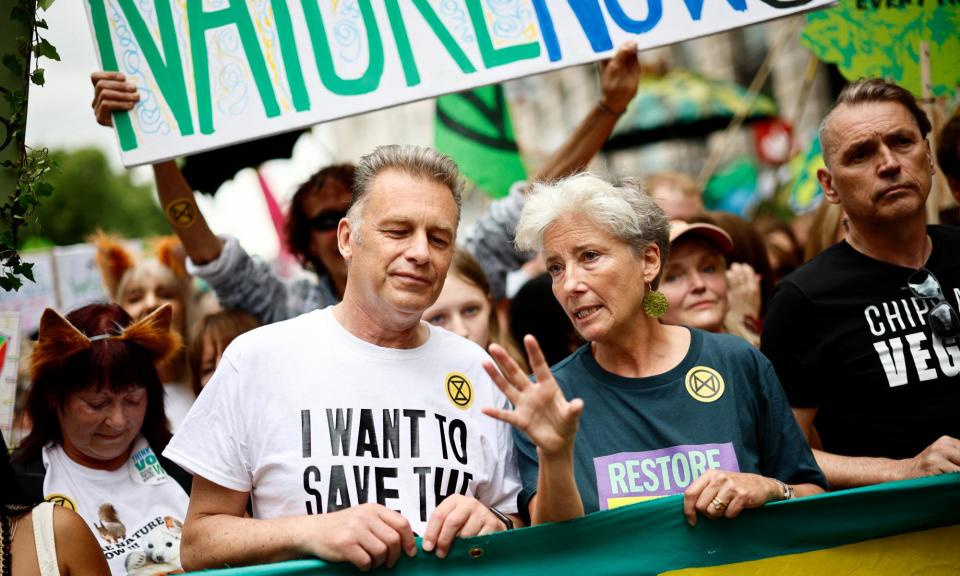Thousands march in London to urge leaders to tackle wildlife crisis
Thousands of people marched through central London to urge political leaders to take more decisive action in tackling the UK’s wildlife crisis.
The protest on Saturday culminated in a rally outside Parliament Square with speeches from prominent figures including the naturalists Chris Packham and Steve Backshall, and poetry readings and performances from Billy Bragg and Feargal Sharkey.
The actor Dame Emma Thompson called on politicians to “act now” on the climate crisis as she led thousands on the march.
Demonstrators descended on the capital wearing glittery outfits, elaborate animal costumes and intricate face paint. Protesters were calm but the placards they held up revealed an undercurrent of frustration and anger. One read: “We have been swimming in shit.” There were also chants of “less faeces more species”.
The UK is one of the most nature-depleted countries in the world, with one in six species in Britain at risk of extinction.
Claire Hawkins, a 57-year-old nurse from Reading in Berkshire, came to the march dressed as an otter with Richard Price, 59, who wore a bright orange octopus hat. Speaking about her reasons for coming to London to protest brought Hawkins to tears.
“What brings me today is my grief over the terrible situation with the climate emergency and the fact that our nature is dying,” she said.
Price restores nature in his local area and says that while he does not think the march is going to make much of a difference materially, it is a “therapeutic” experience for him.
A total of 350 environmental groups came together to pressure the government to act more robustly and decisively against the biodiversity crisis. Charities including the National Trust, the Wildlife Trusts, the RSPB and Friends of the Earth stood side by side with direct action groups such as Just Stop Oil, Extinction Rebellion and Animal Rising.
Packham, who proposed the march, said: “The mission from the start was to bring all of these groups together so that they focus on their similarities and forget about their differences.
“Our message today to our forthcoming government is that we’re not going to go away and we will take to the streets to make the changes that we need to ensure a healthy future.”
Related: Restore Nature Now march in London – in pictures
Environmental groups, campaigners and scientists have said that the government is not doing enough to protect wildlife and nature in England. In 2021 the environmental audit committee found that the government’s “toothless” policies were failing to halt the catastrophic loss of wildlife and were not dealing with the biodiversity crisis urgently enough.
Despite the Conservatives’ vow to halt wildlife decline by 2030, the government’s own watchdog found that the Tory party broke its promise to improve England’s environment, with wildlife continuing to decline at a rapid rate. The ire is not exclusively aimed at the government: Packham said plans to address the biodiversity crisis from almost all political parties had been “inadequate”.
Daniel Fitzgerald, a doctor who travelled from North Fife in Scotland, said it was important to connect the crises with the environment to other problems the world faces. “I’ve had the privilege of working with organisations such as Médecins Sans Frontières and so I’ve seen the impact that the climate crisis is having, not just in the UK but around the world,” he said.
Fitzgerald has worked with displaced people in Sudan and Ethiopia: “In these regions around the globe we are seeing increased crop failures and food insecurity because of climate change. We have to recognise that this is a really wide issue, it’s all connected and it’s going to require us to change how we approach our lives.”
Zoë Benbow, 61, a landscape artist from London, said she had noticed the deterioration of the environment first-hand. “My work can take a couple of years and sometimes I find that I’m painting trees that no longer exist because they have been cut down.”
Chris Evans, a permaculture trainer in his 60s from rural Herefordshire, said “inaction by the government is absolutely criminal” and the march was a way for people like him from rural communities to demonstrate their discontent at Westminster.
Henry Swithinbank, the policy and advocacy manager at Surfers Against Sewage, was standing on the side of the road, shoeless and wearing a gas mask. “We’ve come to Restore Nature Now because the devastation that is being caused to our environment needs all of us to bind together, stand up and demand from whoever forms the next government to set up bold and ambitious plans for time to make changes now,” he said. “We can’t miss this opportunity.”

 Yahoo News
Yahoo News 

